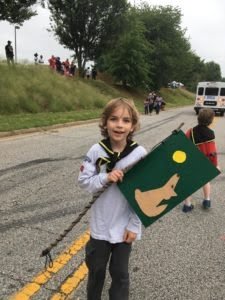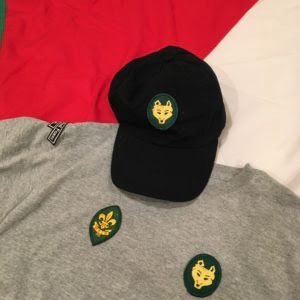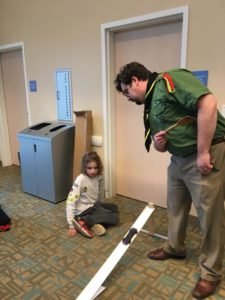Timberwolves, Beyond the Howling
Running a Timberwolf pack can be both extremely rewarding and extremely challenging. Scouts this age are ready to start doing more than they were capable of as otters, but they still need a lot of adult assistance both for safety and to stay on task. I have here some tips for helping you run your pack.
Plan your scout year with the components of the Timberwolf First and Second Stars in mind. Ideally, you will do something from one of those at most meetings or events. Not only so that your scouts can achieve these badges, but because the activities required to earn their stars are the heart of the Timberwolf program.
The best way to teach kids this age, is through games and play. When possible, look at the Star activities and see what you can turn into a game. Almost anything can be fun as a race, but you can also add interest by making something much bigger or much smaller than usual to keep it interesting. Practice polishing doll shoes or work on tying a clove hitch around a huge tree.
While some groups work on using the first year of wolves to do Investure, First and Second Star only, some groups have found success with alternative plans. One other way to do things is to do the Investure, First Star and an additional badge or 2 the first year. Spend the second year completing the Second Star and 2-3 more badges. And then the third year of wolves is spent completing a few more badges and doing the Silver and Gold Leaping Wolf badges. If your scouts are going to earn their Silver Leaping Wolf badge, it is important to review which badges they need for that during their second year of timberwolves and start working on those.
Growing your Pack
It can be challenging when you start adding more kids to your wolf pack, who need to complete requirements your older scouts already have.  Letting all scouts repeat the Investure activities is a solid way to not only get everyone through those, but to make sure your older scouts remember these important things. You may find that you can just keep rotating through the First and Second class star activities each year, and solidify skills in older scouts while helping younger scouts earn them. But keep in mind, you can also dedicate certain field days or camping trip time to knocking out these badges if that helps the flow of your group. The program book should help you create a solid program, not hinder you from working with your scouts.
Letting all scouts repeat the Investure activities is a solid way to not only get everyone through those, but to make sure your older scouts remember these important things. You may find that you can just keep rotating through the First and Second class star activities each year, and solidify skills in older scouts while helping younger scouts earn them. But keep in mind, you can also dedicate certain field days or camping trip time to knocking out these badges if that helps the flow of your group. The program book should help you create a solid program, not hinder you from working with your scouts.
Over the summer we’ve added in having the kids do the badges for Sewing, Household Chores or Fishing – as we don’t tend to do those as a group- and parents can complete them with their kids, without the rest of the group.
We’ve also alternated doing a boat making and floating activity one year and the next year doing a car making and rolling activity. The boats can be made from a wide range of kits or make them from recycled materials, natural/found materials or even fruit or foods. If you do decorate them- be sure to use sharpies or other non-washable markers or paints.
We got a kit to make a ramp and the kids try to design the car that will roll the farthest – instead of having a race. And parents can buy any car kit they want -or make something else. We have this as an indoor event in the very early spring (when the kits are everywhere)- and it works well as a meeting.
Other fun ideas include:
March in a local parade- the 4th of July, Memorial Day, or Veterans Day are all great ideas. 
Rent canoes or kayaks at a local lake.
Take advantage of any expertise a group member has. One year we tried geocaching because we had a leader who could teach it. It was a great experience. Another leader was passionate about teaching map reading skills and made a grid big enough for the kids to stand on it! The kids learned map reading as part of the map!
Further Service Project Ideas:
Get wine bags (grocery stores will usually donate these to scout groups) and have scouts fill them with canned soups, socks and other items to build bags for the homeless. Different age groups can add different items to make this a multiage activity. These can be donated to a local homeless community, or shelter.
Make tie together fleece blankets for those in need.
Make bird feeders, bat boxes or bee homes.
Clean up litter at a park where you meet. We also like to clean up around a local stream when we do our boat making event.
Whatever you choose to plan for your scout group, remember that scouting is a game you want them to keep coming back to play again and again.
